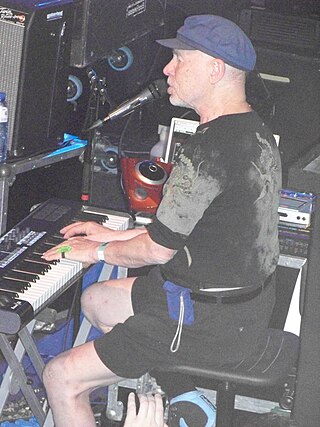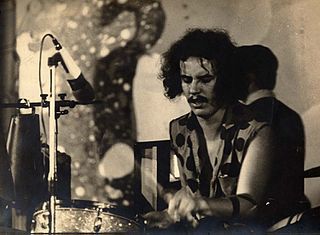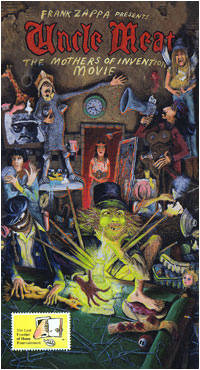
Frank Vincent Zappa was an American musician, composer, and bandleader. In a career spanning more than 30 years, Zappa composed rock, pop, jazz, jazz fusion, orchestral and musique concrète works; he also produced almost all of the 60-plus albums that he released with his band the Mothers of Invention and as a solo artist. His work is characterized by nonconformity, improvisation sound experimentation, musical virtuosity and satire of American culture. Zappa also directed feature-length films and music videos, and designed album covers. He is considered one of the most innovative and stylistically diverse musicians of his generation.

Medium Cool is a 1969 American drama film written and directed by Haskell Wexler and starring Robert Forster, Verna Bloom, Peter Bonerz, Marianna Hill and Harold Blankenship. It takes place in Chicago in the summer of 1968. It was notable for Wexler's use of cinéma vérité-style documentary filmmaking techniques, as well as for combining fictional and non-fictional content.

James Inkanish, Jr., known professionally as Jimmy Carl Black, was an original member of the Mothers of Invention, providing drums and vocals.

Uncle Meat is the sixth album by the Mothers of Invention, and seventh overall by Frank Zappa, released as a double album in 1969. Uncle Meat was originally developed as a part of No Commercial Potential, a project which spawned three other albums sharing a conceptual connection: We're Only in It for the Money, Lumpy Gravy and Cruising with Ruben & the Jets.

200 Motels is a 1971 surrealist musical film written and directed by Frank Zappa and Tony Palmer, and featuring music by Zappa. An international co-production of United States and the United Kingdom, the film stars the Mothers of Invention, Theodore Bikel, Keith Moon and Ringo Starr.
Bizarre Records, self-identified simply as Bizarre, was a production company and record label formed for artists discovered by rock musician Frank Zappa and his business partner/manager Herb Cohen.

Cruising with Ruben & the Jets is the fourth album by the Mothers of Invention, and fifth overall by Frank Zappa, released under the alias Ruben and the Jets. Released on December 2, 1968 on Bizarre and Verve Records with distribution by MGM Records, it is a concept album, influenced by 1950s doo-wop and rock and roll. The album's concept deals with a fictitious Chicano doo-wop band called Ruben & the Jets, represented by the cover illustration by Cal Schenkel, which depicts the Mothers of Invention as anthropomorphic dogs. It was conceived as part of a project called No Commercial Potential, which produced three other albums: Lumpy Gravy, We're Only in It for the Money and Uncle Meat.

The Mothers of Invention were an American rock band from California. Formed in 1964, their work is marked by the use of sonic experimentation, innovative album art, and elaborate live shows.

Mothermania (1969), subtitled The Best of the Mothers, is a compilation album by the Mothers of Invention. While the songs were previously released on Freak Out!, Absolutely Free and We're Only in It for the Money, it contains unique mixes or edits made specifically for this compilation.
Ian Robertson Underwood is a woodwind and keyboards player, known as a member of the original version of Frank Zappa's band the Mothers of Invention. Following the original band's split in late 1969, Underwood continued to work with Zappa extensively during the 1970s.

Ruth Underwood is an American musician best known for playing xylophone, marimba, vibraphone, and other percussion instruments in Frank Zappa and the Mothers of Invention. She collaborated with the Mothers of Invention from 1968 to 1977.

Donald Ward Preston is an American jazz and rock keyboardist. He is best known for being a member of the original version of Frank Zappa's band The Mothers of Invention during the late 1960s. He continued to work with Zappa during the early 1970s following the band's spilt.

Arthur Dyer Tripp III is an American retired musician who is best known for his work as a percussionist with the original version of Frank Zappa's band the Mothers of Invention during the 1960s and Captain Beefheart and his Magic Band during the 1970s. Thereafter, Tripp retired from music. He attended an accredited chiropractic college in Los Angeles from 1980 through 1983, graduating with his Doctor of Chiropractic degree and later practising in Gulfport, Mississippi.

Video from Hell is a video released in 1987 by Frank Zappa. It is a compilation of pieces from a series of video projects by Zappa, some of which did receive full release - including Baby Snakes, Uncle Meat and The True Story of Frank Zappa's 200 Motels - and some which remain unreleased or unfinished, including a companion video for the You Can't Do That On Stage Anymore series of albums. Many pieces from this video had appeared on a one-hour Night Flight special entitled "You Are What You Watch". The music video for the song "G-Spot Tornado" features color 8mm footage that Zappa shot at a county fair in the early 1960s. The music video for "You Are What You Is", which was banned by MTV, is also included, as is footage of a 1982 live guitar solo duet between Zappa and Steve Vai taken from the song "Stevie's Spanking", the audio of which was later released on You Can't Do That On Stage Anymore, Vol. 4. Video from Hell has not been released on DVD.

200 Motels, the soundtrack album to Frank Zappa's film of the same name, was released by United Artists Records in 1971. The original vinyl release was a two-record set, largely containing alternating tracks of rock music performed by the Mothers of Invention and symphonic music performed by the Royal Philharmonic Orchestra conducted by Elgar Howarth, all composed and orchestrated by Zappa. The album peaked at No. 59 on the Billboard 200, though reviewers deemed it a peripheral part of Zappa's catalog. Like the film, the album involves the theme of a rock band on tour and a loose storyline about The Mothers of Invention going crazy in the small town of Centerville and bassist Jeff quitting the group, as did his real life counterpart, Jeff Simmons, who left the group before the film began shooting and was replaced by actor Martin Lickert for the film.
Euclid James "Motorhead" Sherwood was an American rock musician notable for being a member of the original version of Frank Zappa's band the Mothers of Invention, providing soprano, tenor and baritone saxophone, tambourine, vocals and vocal sound effects. He appeared on all the albums of the original Mothers line-up and the 'posthumous' releases Burnt Weeny Sandwich and Weasels Ripped My Flesh, as well as certain subsequent Zappa albums. He also appeared in the films 200 Motels, Video from Hell and Uncle Meat.

Bunk Gardner is an American musician who most notably played for the original version of Frank Zappa's Mothers of Invention until the group disbanded in 1969. He plays woodwinds and tenor sax.
Charles "Buzz" Guarnera was an American trumpet and flugelhorn player. Under the name Buzz Gardner, he was a member of the original version of Frank Zappa's band the Mothers of Invention during the 1960s alongside his brother Bunk Gardner.

Meat Light is a 3CD compilation of Frank Zappa's Uncle Meat recordings. It is project/object #5 in a series of 40th Anniversary FZ Audio Documentaries, following MOFO (2006), Lumpy Money (2009), Greasy Love Songs (2010) and The Crux of the Biscuit (2016).

Edward Seeman is an American artist whose works have spanned disparate fields, from award-winning animated television commercials for children to films of artistic nudity and hardcore pornography. He is also known for his cinemaphotography and for his work with Frank Zappa in the 1960s.
















